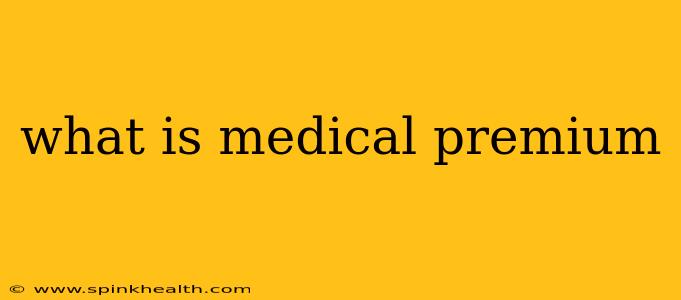What is a Medical Premium? Unlocking the Secrets of Healthcare Costs
Imagine this: you're enjoying a relaxing Sunday afternoon, suddenly a sharp pain shoots through your side. A trip to the emergency room, followed by tests and consultations, leaves you with a hefty bill. This is where the concept of a medical premium comes into play – it's the often-overlooked, yet crucial, upfront cost that helps protect you from potentially devastating medical expenses.
Simply put, a medical premium is the regular payment you make to a health insurance company in exchange for coverage. Think of it as a monthly membership fee to a healthcare club. This payment gives you access to a wide range of services, from routine checkups to emergency care, all at a significantly reduced cost compared to paying out-of-pocket. The amount you pay depends on several factors, which we'll explore in detail below.
What factors determine my medical premium?
This is a question many people have, and understanding the influencing factors can help you navigate the complexities of health insurance. Several key elements determine the cost of your medical premium:
- Age: Generally, older individuals tend to have higher premiums because they statistically require more healthcare services.
- Location: Premiums vary based on geographic location. Areas with higher healthcare costs usually reflect higher premiums.
- Plan Type: The type of health insurance plan you choose (e.g., HMO, PPO, EPO) significantly impacts your premium. HMOs often have lower premiums but stricter network restrictions, while PPOs provide more flexibility but usually come with higher premiums.
- Tobacco Use: Smoking significantly increases the risk of various health problems, leading to higher premiums for smokers.
- Health Status: Pre-existing conditions can influence your premium. While the Affordable Care Act (ACA) protects against discrimination based on pre-existing conditions, your health history might still affect your rate.
- Family Size: Adding dependents to your plan usually increases the premium.
What does my medical premium cover?
Your medical premium unlocks access to a range of services, depending on your specific plan. This typically includes:
- Doctor visits: Routine checkups, specialist consultations, and other medical appointments.
- Hospital stays: Inpatient care, surgery, and other hospital-related expenses.
- Prescription drugs: Coverage for prescription medications, although the specifics vary widely between plans.
- Diagnostic tests: X-rays, blood tests, and other diagnostic procedures.
What's the difference between a premium and a deductible?
This is a common point of confusion. While both are part of your health insurance costs, they represent different aspects:
- Premium: The regular monthly payment you make to maintain your health insurance coverage.
- Deductible: The amount you must pay out-of-pocket for covered healthcare services before your insurance company starts paying its share. Once you meet your deductible, your insurance kicks in to cover a percentage of your expenses (coinsurance).
Can I change my medical premium?
While you can't directly control certain factors like your age or location, you can influence your premium by making informed choices:
- Choosing a different plan: Exploring various health insurance plans and comparing premiums and benefits can help you find a more affordable option.
- Quitting tobacco: Quitting smoking can significantly lower your premium.
- Maintaining a healthy lifestyle: While you can't control pre-existing conditions, maintaining a healthy lifestyle can potentially reduce future healthcare costs.
Understanding medical premiums is key to managing your healthcare costs effectively. By carefully considering the factors that influence premiums and understanding the different components of your health insurance plan, you can make informed choices and protect yourself against unexpected medical expenses.

